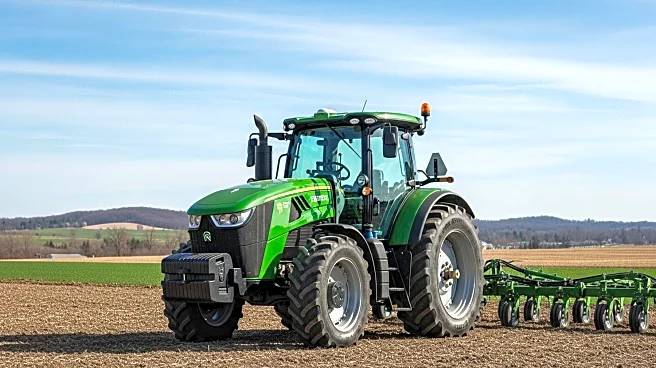What's Happening?
At a recent event hosted by Michigan State University, farmers were introduced to a new electric tractor, sparking interest and feedback. The event aimed to gather insights from farmers on the practicality and efficiency of electric tractors, which have been in development for over two years. Farmers noted the tractor's quiet operation and quick acceleration, though concerns were raised about battery placement affecting field clearance and overall cost. The electric tractor is seen as a potential boon for small farmers focused on sustainability, offering benefits like reduced emissions and compatibility with solar power. However, challenges remain, such as battery life and the need for infrastructure like fast chargers.
Why It's Important?
The introduction of electric tractors could significantly impact the agricultural sector by reducing emissions and operational costs for small farmers. As agriculture is a major source of climate-warming emissions, electric tractors offer a more sustainable alternative. This development aligns with broader environmental goals and could appeal to farmers interested in marketing their products as eco-friendly. However, the transition to electric tractors faces hurdles, including the need for supportive infrastructure and the current limitations of battery technology. The potential for automation in farming, facilitated by electric tractors, could also lead to increased efficiency and reduced labor costs.
What's Next?
The future of electric tractors will depend on overcoming current technological and economic barriers. Companies like John Deere are exploring electric options as part of a broader strategy, while startups like Monarch Tractor are focusing on automation and sustainability. The market for electric tractors may initially be driven by niche segments, such as small-scale or specialty crop farmers. As battery technology improves and infrastructure develops, electric tractors could become more viable for larger operations. Additionally, policy changes, such as the reintroduction of subsidies, could incentivize adoption.
Beyond the Headlines
The shift towards electric tractors also raises questions about the future of farming labor and the role of technology in agriculture. As automation becomes more prevalent, the skills required for farming may change, potentially impacting rural employment. Furthermore, the environmental benefits of electric tractors could contribute to broader efforts to combat climate change, positioning agriculture as a leader in sustainable practices.









